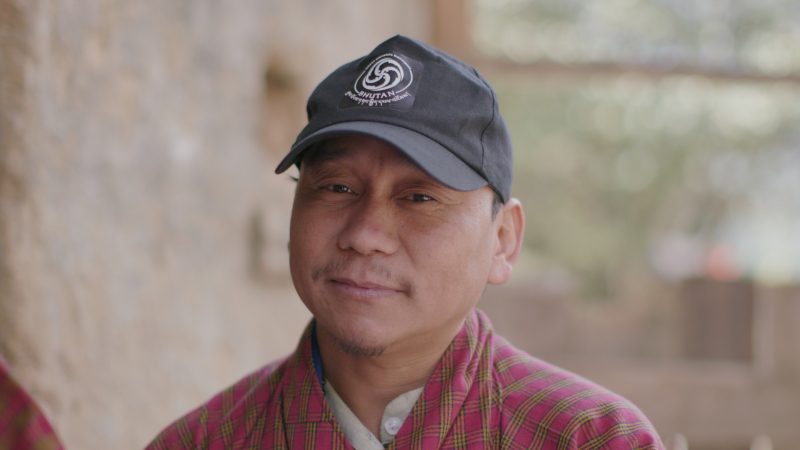Directors – Arun Bhattarai, Dorottya Zurbó – 2023 – Bhutan, Hungary – 94m
****
A civil servant travels around Bhutan assessing individual people’s happiness even as his personal life begs the questions whether he, himself, is truly happy – out in UK cinemas on Friday, July 12th
Judging by the opening montage of cloudy and hilly scenery here, Bhutan may not be the sunniest place on the planet, but it looks fabulously beautiful. In their house, a fortysomething man clips and files his mother’s fingernails. He puts on his uniform (which includes a traditional type of robe), says goodbye to her, and goes out to work. He has a job as one of 75 agents who travel the kingdom conducting surveys assessing people’s happiness. We will only lean his name fortysomething minutes into the film.
The surveys have 148 questions and nine categories. The King of Bhutan has instigated a Happiness Index, to measure Gross National Happiness (GNH), which serves as the basis of future policy to improve his subjects’ lot and make them as happy as they can be.
The agent and his colleague drive around in his car meeting people and asking them the questions. At the end of each interview, a chart overlays the image of the person (sometimes it’s more than one family member) showing marks from one to ten for each category, plus another mark for their overall Happiness Level.
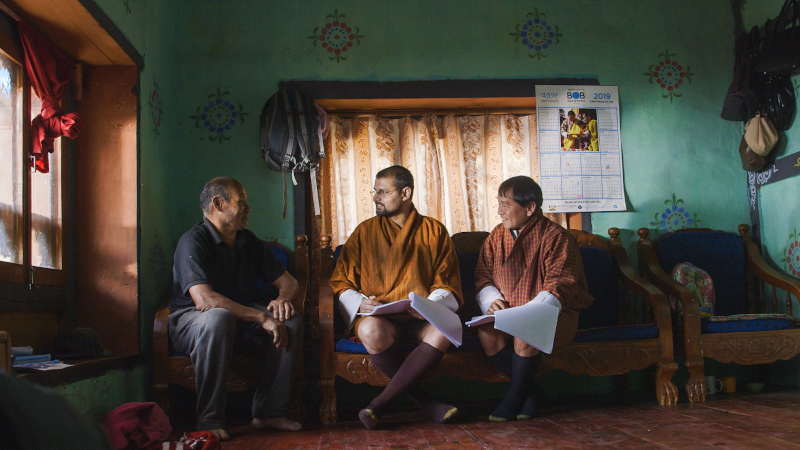
These interview subjects seem to represent a wide cross-section of Bhutanese society. First up is 84-year-old Thinley, who the film gently mocks for his inability to hear the questions properly. Yet, it treats him – as it does all the survey subjects here – with a simple respect. He is asked if he’s married and how many cows he has. He comes out as Happiness Level 09. A woman is currently happy that her cow gave birth yesterday, so she now has two. She comes out as Happiness Level 08. A man, approached while struggling to chop wood with a blunt axe, confesses to anger when hitting his foot on a stone. We watch and listen as he plays the flute, a pursuit which clearly gives him a great deal of personal satisfaction. He comes out as Happiness Level 07.
Not everyone’s life is quite so straightforward. Our travelling interviewer, for instance, would like nothing more than to be married, but has been turned down several times. There is, however, a girl he likes, and they are currently seeing each other, with some of their time together included as footage within this film.
His story is broken up by conversations in the car with his colleague and time the pair of agents spend with interviewees. The number of cows you own is all very well, but while it might be helpful in assessing lives lived in the countryside, it proves far less useful in urban areas.
A nightclub singer is less than happy with her lot, not least because although she was born a man, she feels happier as a woman. Still, it’s not all bad – the first person she told was her mum, who was sympathetic. Mother and child talk about such issues a lot, and we witness the two of them relaxing in the hot public baths and bathing each other there.
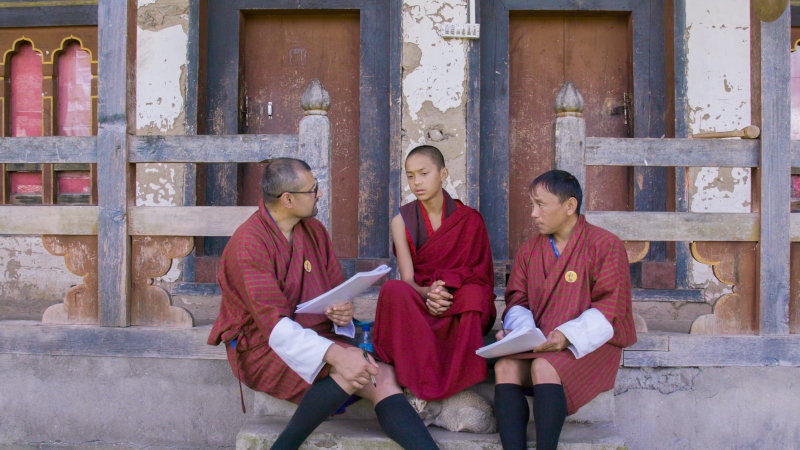
Everywhere our agent goes, it seems, his unmarried status cries out at him. A couple agree that the birth of their first child is the happiest moment of their lives so far. As our agent confesses his dreams of having a family of his own, and playing with his kids in the garden, it emerges that as a Nepali, his citizenship was taken away from him when he was 12. He has been applying to have it reinstated on and off ever since, and its removal has affected his chance at marriage because when the families of girls he likes find out, they turn him away. For a country where the ruler is supposed to be concerned for the happiness of all his people, there’s some pretty heavy – if largely unspoken – interracial strife going on.
Our agent goes to see a soothsayer, finally giving us his name, Amber Gurung. Is his romantic fate written in the stars?, he wants to know. The soothsayer rattles off some reassuring platitudes, then promises Amber he will be married within two years.
We meet an architect – the only professional class person in the film – who designed his own home. We also meet his three wives. Both the architect and this first wife are interviewed (separately) at some length. While the man seems both smug and spoiled, the woman admits that she never loved him and that she gets on really well with the other two wives – the three women appear to relate to one another like three sisters, and wouldn’t ever want to be separated from one another.
We meet a divorced mother, 37, and her two girls, 17 and much younger, maybe ten or 11. Both the 37-year-old and the 17-year-old are eligible for the survey. The 17-year-old thinks her mother drinks far too much, and recalls the happiest day of her own life as the one day her mother didn’t drink. She finds it hard that all her peers at school can go off in the car with mum, dad and siblings, whereas she herself doesn’t have that opportunity.
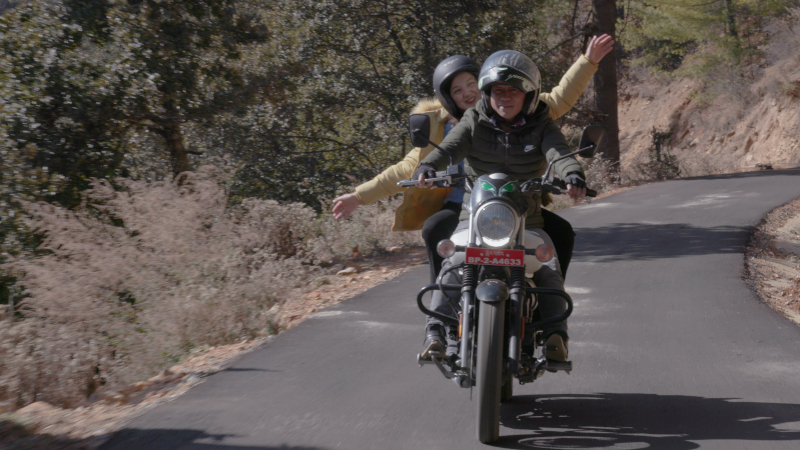
Amber takes his lady love out for a meal in a café, and later drives her into the countryside on his motorcycle so he can take pictures of her in woodlands and wading in the shallows of a lake. He clearly likes being surrounded by nature. Her dream is to travel to Australia, where she plans to study for a couple of years. She would like him to travel with her so they could get to know one another better. So he reveals his citizenship status, which means he can’t get a passport, which means he can’t go with her. She does indeed fly to Australia in the closing minutes. He takes her to the airport, sees her off, and wistfully watches the plane climb into the sky. They seem to like each other, and we hope that when she returns, it will all work out.
This appears to be a very gentle film. It also deals at quite some considerable length with the issue of what makes people happy, what gives meaning to their lives. The short answer, at least as formulated here, is their relationships, their finding the right partner, and how often and in so many different ways that can and indeed does go wrong for people.
We never really get to know the architect. For the architect’s first wife, the answer as to what makes people happy seems to lie elsewhere, in a form of community (her fellow wives), and it’s noteworthy, with the focus of both the happiness survey and the documentary filmmakers on lone people and family units of various shapes and sizes, how strangely absent the idea of community is within the film. As, too, is Bhutanese politics beyond the vague assertion that policy is shaped by the Happiness survey.
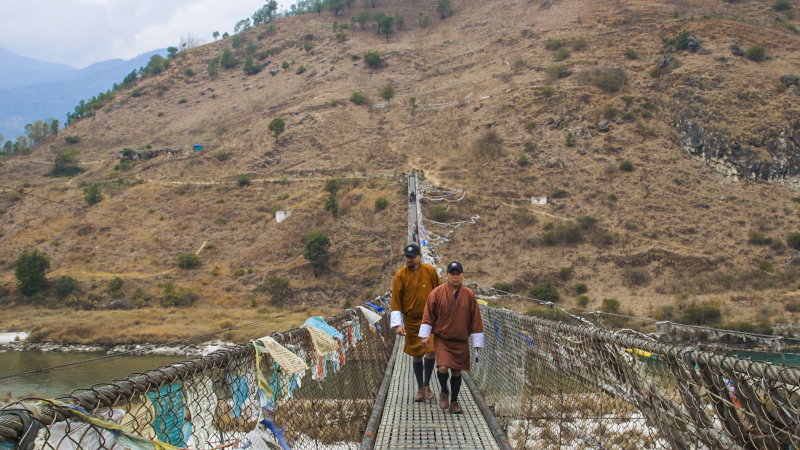
The idea of an unspoken racism, with ethnic minorities such as the Nepali treated rather less well than the rest of Bhutan’s indigenous population, undeniably lurks here and suggests that perhaps the country aiming at improving people’s happiness has other, rather less admirable, goals on its agenda. Not everything in the garden, perhaps, is quite as rosy as it seems.
Superficially, then, a gentle film about a gentle people, mostly optimistic, except that somewhere in its depths, beneath the goodwill, lies a sad and dark element, a terrible travesty of justice in the past making its presence felt in peoples’ lives today.
Agent of Happiness is out in cinemas in the UK on Friday, July 12th.
Trailer:
